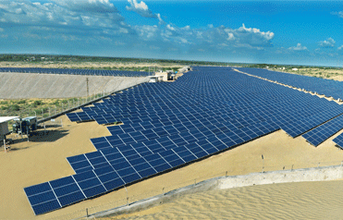
The sun beams 35,000 times more energy towards our planet than what we currently produce and consume. Some part of this energy — better known as solar radiation — is reflected back into space, but a lot of it is absorbed by the atmosphere and other elements surrounding the inner atmosphere. This energy can be easily harnessed to produce electricity power. It is a resource that will not be depleted even after thousands of years.
In contrast, fossil fuel depletion is a global challenge, as these are non-renewable sources of energy. Worse, carbon dioxide emissions by the extensive use of fossil fuel lead to global warming, which can have a disastrous impact on our planet. India - an emerging economy - faces power shortage, but interestingly, the country has an abundance of renewable natural resources such as wind and the sun.
The Aditya Birla Group is moving towards energy sustainability in a focused manner; all our actions are guided by whether we are depleting our resources or using them responsibly and how we can find new ways to reduce emissions. The Group, for instance, is a world leader in the recycling of aluminium cans. Sustainability makes sound business sense. Moreover, it is about doing the right thing for the future.
Rise and shine
Setting up the Solar Power Business was the first step by the Group in addressing energy sustainability. Renewable energy, especially solar energy was identified as a sunrise business opportunity by the Aditya Birla Group in early 2011, when the Solar Power Business team was formed. The team first evaluated the complete value chain of solar projects in the country, short-listing areas that matched the Group's interests.
The team's first project was the installation of a 5MWp solar power plant at Vituza village in Rajasthan, India. This project came with an exceedingly tight timeline due to tariff applicability restrictions. Analysing the opportunity and its associated risks, and knowing that this kind of tariff opportunity wouldn't repeat itself, the team took the project on, undaunted by the tight deadlines or even the fact that this was their first project.


























